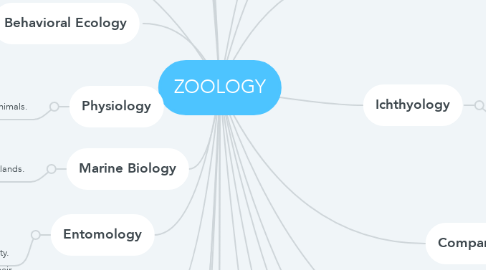ZOOLOGY
by Sharloumagne Barrientos

1. Paleontology
1.1. is the investigation of antiquated life, from dinosaurs to ancient plants, well evolved creatures, fish, creepy crawlies, organisms, and even microorganisms.
2. Marine Biology
2.1. simply put, marine biology is the study of life in the oceans and other saltwater environments such as estuaries and wetlands.
3. Physiology
3.1. Physiological and Biochemical Zoology is a peer-reviewed scientific journal published by the University of Chicago Press on behalf of the Society for Integrative and Comparative Biology.Traditionally, it has covered research on the biochemistry, physiology, and genetics of animals.
4. Embryology
4.1. Embryology is the branch of biology concerned with the development of new organisms. There are many subdivisions of embryology, some scientist focusing on human embryos, while others study animals and plants.
5. Animal Psychology
6. Evolutionary Biology
6.1. it studies the evolutionary process that produced the diversity of life on Earth.
7. Entomology
7.1. Entomology, branch of zoology dealing with the scientific study of insects. also plays an important role in studies of biodiversity and assessment of environmental quality.
8. Ecology
8.1. Ecology is the study of organisms and of their interactions with their biotic and abiotic environment, whereas zoology is the study of animals. It is important to understand how animals function on their own and how they interact with each other to better understand how they interact with other living organisms (e.g., bacteria, plants, fungi) and with their biotic environment.
9. Behavioral Ecology
10. Bionics
10.1. Bionics is not limited to just the human body, there are a wide variety of aspects that it helps. Some of the earliest examples of bionics is Velcro and the bullet-proof vest. Velcro was created by George Da Mistral, whom discovered the applications of a material from the burrs that hooked onto his dog during walks. The bullet-proof vest was created through the observing the toughness of cobweb. The implications of bionics are indefinite.
11. Physics
12. Hence zoology at molecular level is just complicated chemical reactions. Like for eg. love is just production of some chemicals (oxytocin) in brain, diabetes is disbalance of blood glucose and so on and many animals respond to physical force eg. birds find their way by magnetism or some sponge release their gametes in sea on third day after full moon (may be due to change in gravitational force and warping of time and space) and mammals have internal ears which help in orienting animal due to sensation by force of gravity etc.
13. Zoology is the study of the biology of animals. Animals behave, so some zoologists study behavior in the context of biology. Humans are animals too, so, strictly speaking, some zoologists study humans and their behavior too. It is useful at this point to remind ourselves that we are animals, and that the study of animals often generalizes to human studies. Theoretically, zoology is dominated by the theory of evolution. Zoologists' nearly single-minded devotion to that theory makes zoology quite different than psychology. Specifically, zoologists tend to be much more likely to search for functional explanations of behavior than are most psychologists.
14. Behavioural ecology in its broadest sense is the study of adaptations, and the selective pressures that yield them, in different ecological environments. Some adaptations are behavioural and sometimes behaviour drives the evolution of new adaptations by creating new selective environments.
15. Morpholgy
15.1. it manages the structure, shape, and size of animals.
16. Molecular Biology
16.1. is the field of science that reviews the creation, structure and communications of cell atoms –, for example, nucleic acids and proteins – that complete the natural cycles fundamental for the cell's capacities and support.
17. Ornithology
17.1. The branch of zoology that deals with the scientific study of birds.
18. Taxonomy
18.1. taxonomy is, therefore, the methodology and principles of systematic botany and zoology and sets up arrangements of the kinds of plants and animals in hierarchies of superior and subordinate groups.
19. Zoography
19.1. Zoography, also called descriptive zoology or zoogeography, is the study of animals and their habitats. It is concerned with the geographic ranges of specific populations of animals, their effects on the ecosystems they live in, and the reasons for a specific spatial distribution of an animal species.
20. Comparative Anatomy
20.1. Comparative anatomy explores and establishes the correspondences between body parts of organisms from different species. It builds the concepts of the living structures and thus must not be confused with morphology (the study of the forms and their variations) nor with Evo- Devo (the study of the relations between genetics of the development and evolution). Without comparative anatomy, naming and understanding what can be seen in organisms would be impossible. Then, neither descriptive embryology, causal embryology, phylogeny, palaeontology nor systematics could be conducted and the understanding of both biology and evolution of species would be dead-end streets.
21. Ichthyology
21.1. Ichthyology is the branch of zoology devoted to the study of fish, including: bony fish, Osteichthyes; cartilaginous fish, Chondrichthyes; and jawless fish, Agnatha. The discipline can include the biology, taxonomy and conservation of fish, as well as husbandry and commercial fisheries.
22. Environmental Science
22.1. Zoologists study the physiology of animals, their behavior, and how they interact with other species and their environments. Their knowledge is critical to preserving important habitats and managing wildlife's adaptations to climate change.
23. Chemistry
23.1. Zoology is the science of study of animals. Animals, like all life forms, are composed of and dependent upon an assortment of chemical compounds. To understand the chemistry of life, we need to first understand the basics of general chemistry.
24. History
24.1. Humans are classified as animals, as species Homo sapiens; however, humans are unique, and define themselves in not just biological or zoological terms, but also in psychological, moral, spiritual, and social terms. Thus, the study of humans goes well beyond the discipline of zoology.


